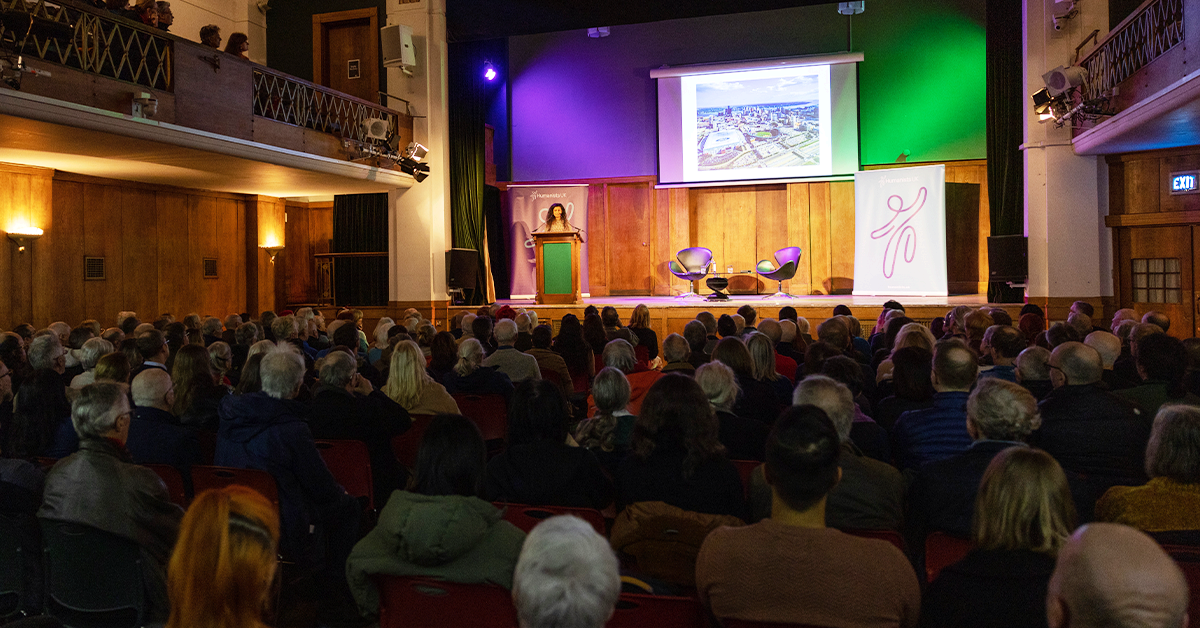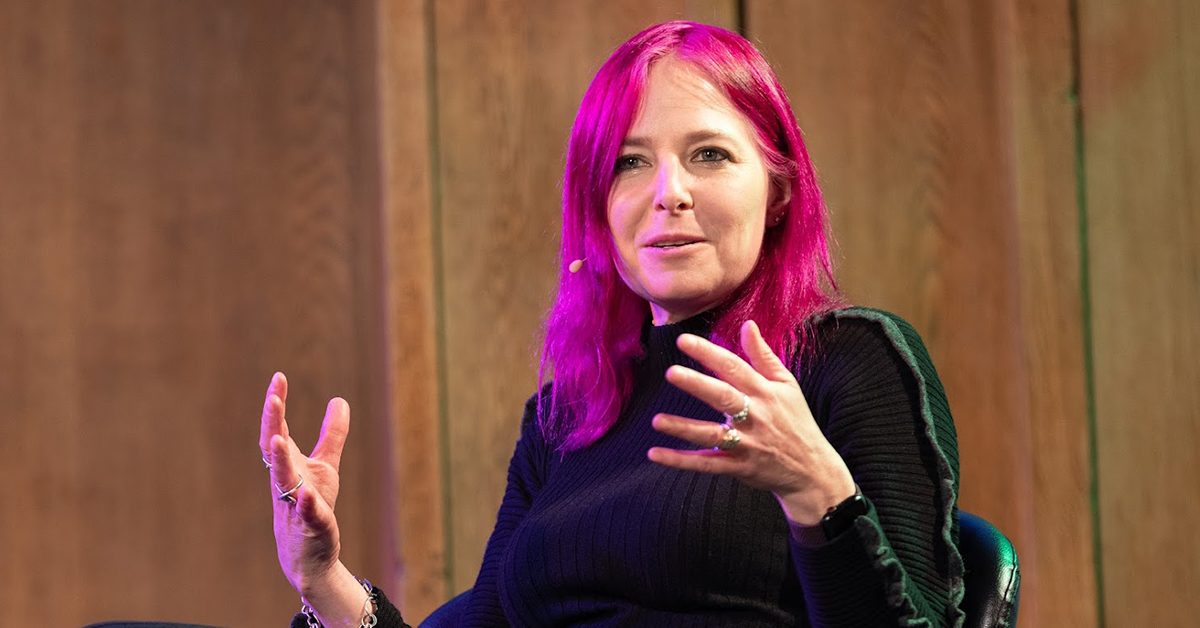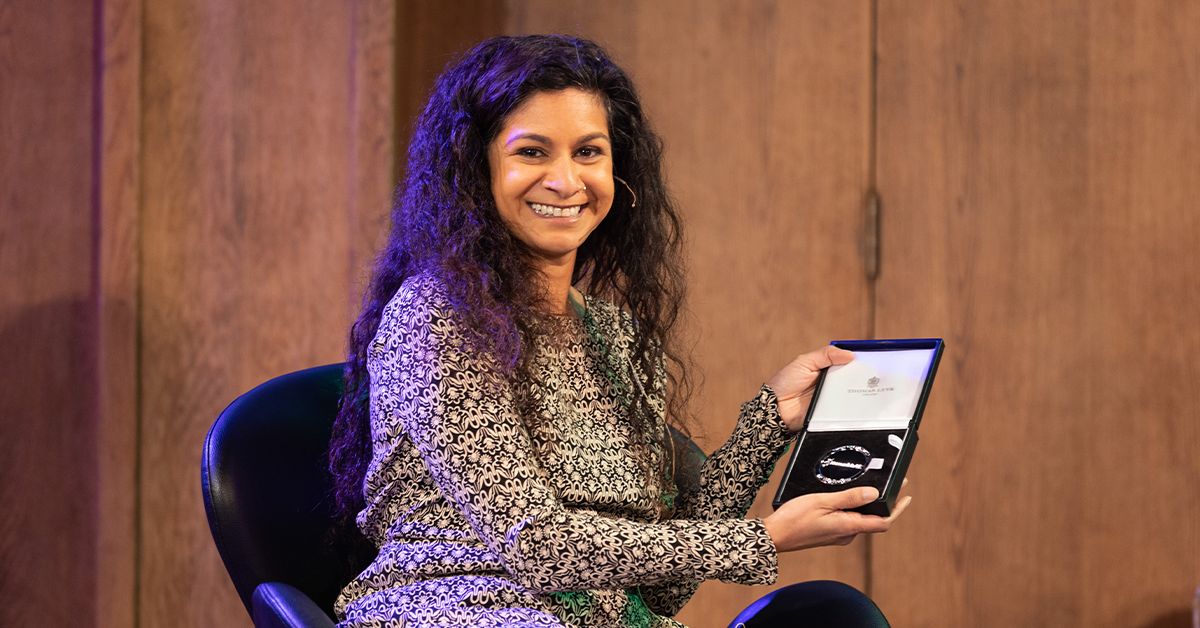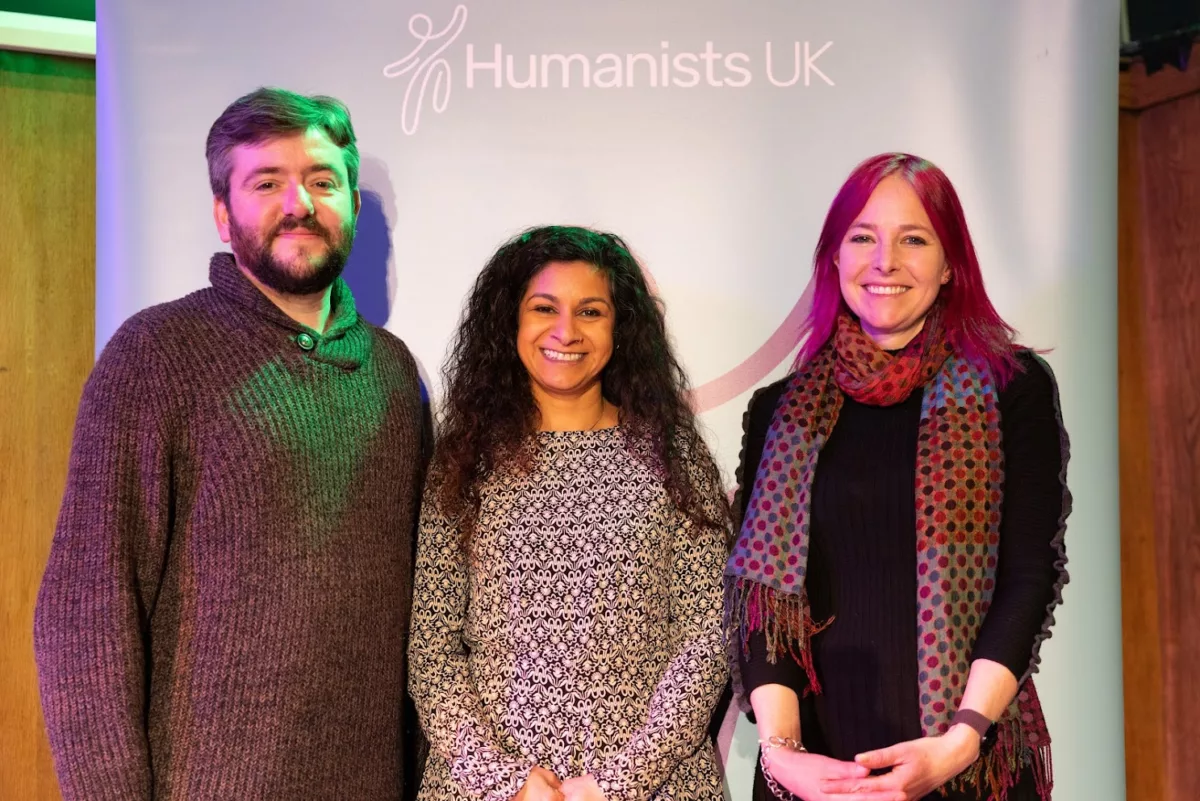
Yesterday evening, Professor Anjali Goswami delivered the prestigious Humanists UK Darwin Day Lecture 2023, on ‘The Speed of Life: A Deep Time Perspective’, an exploration of the evolution of biodiversity, the variable rates of evolution among species, mass extinctions, and the urgency with which governments across the globe must act if we are to save and preserve Earth’s biodiversity. The Darwin Day Lecture was available to watch both online and in person, with a sellout audience of 400 people joining Humanists UK in London’s Conway Hall, with hundreds more joining on the official Darwin Day Lecture YouTube livestream. As in previous years, the Darwin Day Lecture was chaired by evolutionary anatomist and Humanists UK President Professor Alice Roberts.
Humanists UK’s Darwin Day Lecture is the centrepiece of national Darwin Day celebrations in the UK. Since Humanists UK first created the lecture series in 2003, it has grown to become a major event in the national calendar. At the same time, Darwin Day has become widely celebrated around the world, with hundreds of thousands of people each year participating in events exploring the life, work, and ideas of Charles Darwin.

Following a charming account of Anjali’s childhood experiences leading to a lifelong fascination with the natural world (including the curious evolution of cats), Anjali underscored the passion that motivates her own research, and that all scientists share, including Darwin himself. ‘We are at the edge of human knowledge, and we are always striving to go further. This takes passion,’ she said, reflecting on the humanist approach to science. ‘It’s clear that Darwin himself embodied this passion.’ This, she said, for many, underscores the grandeur of life. Science can add to the beauty of life, rather than seeming ‘cold and sterile’.

What followed was a tour de force illustration of Goswami’s research findings, illustrating the different rates of evolution of life, and the selective pressures and ecological factors that accelerate or decelerate evolution, the Darwin Day Lecture audience was treated to the ‘melody and rhythm of evolution’ – where by high and fast musical notes represented faster rates of evolution in different species, and low and slow notes represented slow rates of evolution, and so on. ‘Living organisms alive today are only a small fraction of all life to have ever lived’, said Anjali, ‘we must look into our evolutionary past to understand the species of the present.’ She ended the lecture on a slightly more sombre note, comparing the prehistoric extinction events of millions of years ago to the sheer scale of biodiversity loss Earth has experienced since the 1970s. Are we living through the beginning of an extinction event?, she asked. If so, she pointed out, the key difference was that today’s dominant species was not ‘facing a comet’, but instead ‘facing a choice.’ Following the lecture and an expansive question and answer session, including from front-row guest Professor Robert Winston on the subject genetically modified organisms and how they might impact biodiversity, Alice Roberts presented Professor Anjali Goswami with the prestigious Darwin Day Medal in recognition of her groundbreaking research in the fields of evolutionary biology and paleobiology.

Humanists UK Chief Executive Andrew Copson said:
‘Congratulations to Professor Anjali Goswami on being awarded Humanists UK’s Darwin Day Medal. Professor Goswami’s groundbreaking work has undeniably made a significant impact on our understanding of the history of life on Earth. Professor Goswami embodies the spirit of Darwin’s legacy.’

Notes
It was Humanists UK’s best attended Darwin Day celebration in recent years, and only the second in-person Darwin Day Lecture since 2022. The YouTube livestream will be made available to watch on Humanists UK’s YouTube channel in the coming weeks.
About Professor Anjali Goswami
Professor Anjali Goswami is a Research Leader in Palaeobiology and Dean of Postgraduate Education at the Natural History Museum and an Honorary Professor of Palaeobiology at University College London. She currently serves as President of the Linnean Society of London, the first person of colour elected to this role in its 235-year history. Anjali completed a joint BSc with High Honours in Geological and Biological Sciences from the University of Michigan and a PhD in Evolutionary Biology from the University of Chicago, before moving to the UK to take up a US National Science Foundation research fellow at the NHM. She then spent ten years as a faculty member first at the University of Cambridge and then University College London before returning to the NHM in 2017.
Anjali’s expertise is in vertebrate evolution and development, particularly using high-resolution 3D images of specimens to quantify and reconstruct the evolution of biodiversity and understand how development, ecology and large-scale environmental effects have shaped animal evolution through deep time. She has published more than 130 scientific articles on the evolution of different groups from insects to dinosaurs, but her main interest is in the evolution of mammals. She has searched for fossils all over the world, from Svalbard to Madagascar, and currently leads expeditions in Argentina and India. Anjali also created and manages Phenome10k, a free online database for 3D biological images for research and education.
About Professor Alice Roberts
Professor Alice Roberts is Vice President of Humanists UK. She is Professor of Public Engagement in Science at the University of Birmingham, Director of Anatomy for the NHS Severn Deanery School of Surgery, and holds honorary fellowships at Hull, York Medical School, and the University of Bristol.
She is an honorary fellow of the British Science Association, a member of the Advisory Board of the Cheltenham Festival of Science, Patron of the Association of Science and Discovery Centres, and a member of the Council of the British Heart Foundation.
She combines her academic career with one as a science presenter on television. She has appeared as a human bone specialist on Channel 4’s Time Team and in various projects on BBC2, including Coast, Don’t Die Young, The Incredible Human Journey, Wild Swimming, Digging for Britain, Horizon, and Origins of Us.
About the Darwin Day Lecture series
The Darwin Day Lecture explores humanism and humanist thought as related to science and evolution, Charles Darwin, or his works. The Darwin medallist has made a significant contribution in one of these fields. The lecture and medal are named and held to mark the annual global celebration of the birth of Charles Darwin, held every 12 February.
About Humanists UK
Humanists UK is the national charity working on behalf of non-religious people. Powered by 100,000 members and supporters, we advance free thinking and promote humanism to create a tolerant society where rational thinking and kindness prevail. We provide ceremonies, pastoral care, education, and support services benefitting over a million people every year and our campaigns advance humanist thinking on ethical issues, human rights, and equal treatment for all.
